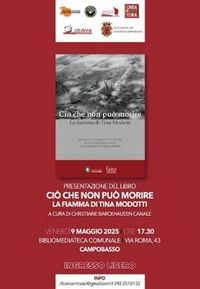The first notebook of "Raccolte storiche", curated by the Centro di documentazione e ricerca of the Università Cattolica of Brescia, has been released, shedding light on Italy's educational history.
The book, titled "È tutta Italia la Patria mia. Libri scolastici e altre testimonianze di scuola (1860-1960)", was presented in the Sala della Gloria at the university's via Trieste location. It emphasizes the importance of schoolbooks in shaping national identity and public opinion during pivotal moments in Italian history.
Published by Ronzani Editore, the book spans 352 pages and is priced at 28 euros. It includes a catalog of 600 volumes, featuring around 100 publications focused on didactics, pedagogy, and children's literature, showcasing the educational resources used throughout Italy's unification period.
Rossella Coarelli, the author, meticulously gathered historical materials that had been overlooked, presenting a treasure trove of insights into the role of educational texts in Italy's development. "Schoolbooks are often seen as minor materials, but they hold immense value in understanding societal evolution," Coarelli noted during the presentation.
The themes explored in the book include the construction of national identity between the 19th and 20th centuries, the issue of language, the desire to form a secular morality, and education in hygiene. The book also examines how schoolbooks acted as tools of justification during wartime and served as propaganda during the fascist regime.
Professor David Salomoni, a historian of pedagogy at the University of Siena, highlighted that these texts reflect societal expressions of their time. He stated, "In these texts, we find everything that was expressed historically by society."
From 1860 to 1910, the themes prevalent in liberal Italy included literacy, reaching rural peripheries, and the teaching of religion amid the State/Church conflict. The role of female educators during wartime was also emphasized, alongside a return to traditional female role models during the fascist era.
Salomoni remarked on the significance of civic education post-World War II, describing it as both an endpoint and a beginning. "In these books, we see the reflection of a culture, and these themes challenge us to think critically," he added.
Meanwhile, Giancarlo Prosperi's new book, "Luoghi dell’Abruzzo Ulteriore 1° alla fine del Regno delle Due Sicilie", will be presented on May 10, 2025, at 4:30 PM in the Teatro Comunale of Atri. The event will feature Marilena Rossi, a regional councilor, along with speakers including sociologist Ezio Sciarra and regional FEISCT representative Ivonne Pincelli.
This work delves into the crisis of Southern Italy, particularly Abruzzo, during the national unification process, focusing on the evolution of public opinion and political life from 1853 to 1865. The appendix includes detailed descriptions of locations in the then Abruzzo Ulteriore Primo, now the provinces of Teramo and Pescara, as documented by Gabriello Cherubini and others for the encyclopedic work "Il Regno delle Due Sicilie descritto ed illustrato".
Prosperi's thorough historical research invites readers to engage with the sounds, trades, and customs of a bygone Abruzzo, fostering a critical understanding of the processes that led to Italy's unification and the formation of the modern state. Prosperi holds degrees in Sociology and Pedagogy from the University of Urbino and has received multiple national awards for his contributions to literature and pedagogy.
In a different cultural initiative, the Centro per la Fotografia Campobasso "Vivian Maier" is set to host the presentation of the book "Ciò che non può morire. La fiamma di Tina Modotti" on May 9, 2025, at 5:30 PM at the Bibliomediateca comunale in Campobasso. The curator, Christiane Barkhausen-Canale, has dedicated her life to researching Tina Modotti, a significant figure born in Udine in 1896.
Since 2016, Barkhausen-Canale has been residing in Bonefro (CB), where she founded the "Archivio Tina Modotti" and the association "Crea Tina". The archive holds a wealth of unpublished photographs, books, monographs, and documents collected over 35 years, contributing significantly to the understanding of Modotti's life and work.
Modotti's journey from a young worker to an actress in the United States, and later a photographer and activist, reflects the turbulent history of the early 20th century. The book captures the essence of her spirit and determination, showcasing her as a pioneering feminist figure.
Various authors, including Pilar Gómez Rodríguez and Claudia Marcucetti Pascoli, contributed to the book, which aims to enchant readers with Modotti's story and the reasons behind her lasting impact. The book features illustrations by Ángel de la Calle and is published by Epics Edizioni.
As these cultural events unfold, they highlight the rich tapestry of Italy's historical narrative, emphasizing the importance of education, literature, and the arts in understanding the country's past and shaping its future.





